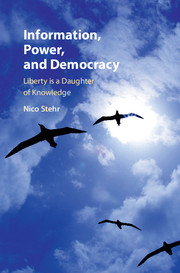Book contents
1 - Coming to terms
Published online by Cambridge University Press: 05 December 2015
Summary
A greater degree of civil freedom appears advantageous to the freedom of the mind of the people, and yet it places inescapable limitations upon it; a lower degree of civil freedom, on the contrary, provides the mind with room for each man to extend himself in full capacity.
Immanuel Kant ([1784] 1986:269)There are hardly any other words in any language that are as frequently employed as are democracy and knowledge. For this reason alone, both terms are embedded in systematic ambiguity (Merton, 1957a:497). Nor are there many words that consistently meet with such partiality and approval as democracy and knowledge. Put more formally, the terms democracy and knowledge typically perform the speech-act of commending what they describe (cf. Sartori, 1968). Given the strong aura that these terms carry, it is impossible to avoid the conclusion that all political ideologies use democracy and knowledge to legitimate, rather than to enlighten (Saward, 1993:63–64).
At the same time, there are few other social phenomena that are generally more significant for modern societies than knowledge and democracy. Even political regimes that are authoritarian systems prefer to claim that they constitute democracies; even states that are considered liberal democracies have their “dark side.” A study employing objective criteria concludes that in the last century, there is not only an unambiguous trend toward democratization of modern societies, but at present, more than half of all states are democracies (Mansfield and Pevehouse, 2006; Sorensen, 2010:441). Although democratic sentiments are not necessarily a robust determinant of democratization (cf. Teorell and Hadenius, 2006; Berg-Schlosser, 2003), as the World Values Survey demonstrates (Inglehart, 2003), a clear majority of the global population endorses democracy.
By the same token, the socioeconomic (and military) importance of scientific and technical knowledge has grown in production processes, and is regarded as both the motor of societal change and the source of the problems faced by society in general and the political system in particular. At least at the collective level of societies, the dissemination of democracy around the world coincides with the immense growth of knowledge and knowledgeability, as well as with a historically unprecedented increase in the general standard of living within many societies; notwithstanding, of course, the fact that many households have not emancipated themselves from the constraints of basic survival, and that poor educational achievements are far from eradicated.
- Type
- Chapter
- Information
- Information, Power, and DemocracyLiberty is a Daughter of Knowledge, pp. 14 - 75Publisher: Cambridge University PressPrint publication year: 2015



